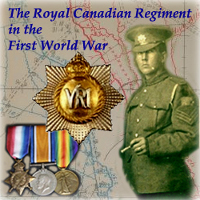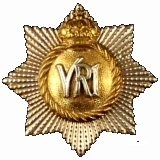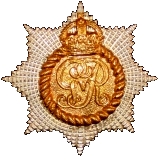
Recollections of a Nonagenarian
of Service in The Royal Canadian Regiment (1916-19)
Part 2
by Robert England, M.C.
1917; VIMY RIDGE
Our strenuous training in Bruay for the Vimy battle, going over tapes, discussing map locations, getting accustomed to barrage tables as well as continuing routine drills and inspections was broken into by a very important visitor. Prime Minister of Canada, Sir Robert Borden came to Bruay, and the R.C.R. provided the guard of honour. Lt. Col. Hill took great pains with the mounting of this guard and chose three temporaries as its officers. Capt. C.G.B. Thompson, Lieut. T.S. Allan and me—a recognition that gave us much pleasure.
My fellow officers saw that I had a hot meal, insisted on my drinking an enormous tot of rum and I was tucked into my bed-roll about 10 p.m., where I slept until after 2 p.m. the next day.
Before starting our Bruay training, we had been inspected by General Sir Douglas Haig on February 14 and three days later by the Commander-in-Chief of the French Army, General Nivelle, on whose great attack plan Vimy Ridge was to be the necessary opening phase.
Bruay gave us relief from the water-logged trenches, gas attacks, cold, rain, rats, lice, trench feet, machine-gun fire, snipers, and the weary foot-slugging to and from the trenches. We had smoking concerts, beer parties, "Dumbells," and the pleasures of estaminets and the better cooking of civilians. We looked forward to the attack.
In the 7th Brigade, three battalions—The Royal Canadian Regiment on the right, Princess Patricia's Canadian Light Infantry in the centre and the 42nd Battalion, Royal Highlanders, on the left; the 49th Battalion Edmonton Regiment being in reserve constituted the order of battle. "C" Company, the R.C.R.—after overnight assembly in the Grange Tunnel (750 yards long, electric light and water supply) reached the jumping-off trenches by 3:40 a.m. on April 9, under the command of Lieut. T.S. Allan. My first task was to lead a working party of my No. 10 platoon to cut lanes through our wire, my best help in this was a Russian-born tough member of my platoon, who, impatient with wearing gloves rolled aside the wire with his bare hands and pulled up stakes. One of our party was hit by enemy sniping, and cried out loudly, to our consternation. As I bent over him, I suddenly found my fellow-officer, Fred Lewis, at my side. The enemy flares became active. Fred suddenly moved to lift the man, and eventually with some support he carried him to our jumping-off trench, where a stretcher-bearer did whatever he could, but the wounded man died quietly before 5 a.m. and by this time the line and shelling seemed normal, indeed rather still.
At 5:30 a.m. our barrages of artillery and machine guns opened, heightened by mortars throwing flaming oil-canisters on enemy front lines. After three minutes the barrages moved on 100 yards. We followed the rolling, creeping artillery barrage as closely as we dared despite some "shorts." Knowing that our only hope was to catch the enemy emerging from dug-outs to man machine guns. My platoon No. 10 had to mop up strong points and dug-outs as platoon No.9 under Fred Lewis pushed on—this son of a doctor from Orangeville (Ontario) sometimes even got ahead of our barrage with Irish impulsiveness and fearlessness, indeed a happy warrior until severely wounded when beyond our Red Line, our Final Objective near Ecole Commune.
Prisoners poured in; my Russian soldier—my aid on cutting wire appeared suddenly decked out with a German helmet, a German officer's coat and Zeiss field glasses, cheerful, feeling recompensed for his pre-dawn work. Those of us actively engaged in what was clearly a well-planned attack, as we moved ahead to some extent, saw little of the cost, as we couldn't stop for casualties left for stretcher-bearers and medical corps, but increasingly we were conscious that our ranks were being depleted. At one dug-out I saw two men jump a trench and fall to a hidden German sniper firing to his rear from the dug-out entrance. I dropped my revolver on its lanyard, and was pulling the refractory pin of a bomb when Sgt. Cornforth, despite my warning, jumped across to tackle the sniper, but was killed. Suddenly the sniper appeared and though only five feet away he fired at me and missed, giving me time to drop my bomb. It is odd that sixty years later, escape from so many hazards should be generalized and half-forgotten, while this close-quarter single shot remains clear, and my escape seems miraculous. This dug-out became advance battalion headquarters that night, and I noticed the German soldier had an Iron Cross. The German Army in 1917 was a most effective fighting force, perhaps at the peak of its military power. By 7 a.m. we had captured the Black Line, 700 yards from our jumping-off trench, and, as soon as we could, we began to dig Strong Point 5, which was the duty of Platoon 10.
"A" and "B" companies arrived, and went on to Ecole Commune, meeting heavy machine-gun fire in La Folie Wood. We sited Strong Point 5 slightly ahead of the junction of Artillerie Weg and Famine Feather trenches. Major Willoughby paid us a visit, and established advance battalion headquarters in the captured dug-out to our rear.
A delay in the capture of Hill 145 by the 4th Division left us exposed to enfilade fire from the top of the Ridge until the afternoon of the 10th, so we had a bad night on the 9th with much enemy shelling and threatened counter-attacks in sleet and snow and cold.
On the 10th, I was asked to undertake a patrol from the foot of the deep declivity through the enemy communication trenches leading to Petit Vi my. I agreed, but stipulated the 20 men detailed should be from the reserve, the 49th Edmonton Battalion, as our men after sleepless nights, exhausting fighting and entrenching and horror under shell-fire, were physically incapable, however willing, to undertake such a demanding probing patrol. The Fetherstonhaugh History's (p. 282) account with map showing the success of this patrol omits to note that the 20 men involved were members of the 49th Battalion. I took with me Corporal Neil Nicholson of the R.C.R. who, prior to 1914, had served in the North West Mounted Police and had a good sense of direction and understood rear-guarding in withdrawal and communication as vital. Lt. W. H. Morris of the P.P.C.L.I. (4) and I agreed on our timing. Both patrols of the P.P.C.L.I. and the R.C.R. met heavy enemy fire and made our presence known and effective. It was clear that without adequate troops and artillery support, isolated patrols risked being cut-off, and the enemy was not prepared to surrender the Douai plain and the roads and railway to Lens. We saw that the P.P.C.L.I was retiring, and as we withdrew we owed our safe retirement to the steadiness and coolness of our 49th men and NCO's, who so gallantly accepted our command. Corporal Nicholson was awarded the Military Medal.
After 62 years, as I write this, I marvel at my temerity in command of men I didn't know, and now I realize that losses in such a venture might well have resulted in recriminatory comment that might have been embarrassing for years.
On the 11th April we were relieved by the 58th Battalion. My fellow company-officers, Steve Allan and W.M. Wallar, both had been near casualties by shell-bursts and were totally exhausted. They and many of our men and equipment were transported to Villers-au-Bois. I assembled the few survivors who could walk carrying minimum equipment. We crawled to the base and we were greeted warmly. My fellow officers saw that I had a hot meal, insisted on my drinking an enormous tot of rum and I was tucked into my bed-roll about 10 p.m., where I slept until after 2 p.m. the next day. I was very stiff, but went on parade for roll-call to secure information about casualties. I was noting details when Sgt. Major O'Connor behind me sharply interrupted "Stand to attention, Sir!" I turned quickly and saluted the G.O.C., General Sir Julian Byng, with his staff, who said "Stand easy! You did a grand job" and rode slowly on. Sgt. Major O'Connor saluted and said "Sorry, sir. I knew you didn't see him. So I had to speak up. Served with him in Egypt, sir." I thought I detected the glint of a smile on Sir Julian Byng's face, he had probably overhead the O'Connor alert to me.
The victory was undoubted, the cost heavy—7 officers and 50 other ranks killed; 65 missing; 6 officers and 150 other ranks wounded.
Vimy Ridge remained in the hands of the British Army for the rest of 1917 and 1918, despite German successes in March 1918 when the Canadian Corps held it, until it finally became a fulcrum "un point d'appui" upon which the great Allied armies wheeled and thrust their power against the faltering but still arrogant might of the German Empire.
In April 1917 the four divisions and auxiliary services of the Canadian Corps defeated 9 German divisions and captured 7,000 prisoners and 67 guns, penetrating 10,000 yards into enemy lines. The infantryman going over the top to attack without great-coats, carrying rifle, bayonet, 120 rounds of cartridges and grenades, had complete confidence in his leaders, in his support by artillery, machine guns, Stokes mortars, engineers (exploding mines), transport, medical and service corps, ration parties, other brigades and divisions and above all by the people of Canada. The comradeship of the members of the old Canadian Corps forged in such a significant and bold operation gave the new Canadian Commander, Sir Arthur Currie, an unbeatable combination which he used with great skill-esprit de corps, high morale, and trained military combatant capabilities with Canadian pioneer aptitudes.
Soon after Vimy Ridge I went to Paris on leave, travelling with Lieut. Charley Otton of the 43rd Cameron Highlanders (Western Canada) in his kilt. This bonnie-looking Scots officer assured both of us a welcome, wherever we went, and the record of the victory at Vimy Ridge helped. Major Algy Willoughby and Lieut. Eric McCallum, D.S.O., were just finishing their 10-day leave and I found them at the Ritz and joined with them in some of their cheerful celebrating.
On my return to duty Steve Allan remarked to me that among the new officers there was a Milton Gregg, an Acadia University student with a similar background to ours, who had already a good record of service in France; so he supplied for us the gap left by our loss of Fred Lewis.
I became Scout Officer, and after a time Lt. Col. C.R.E. Willets asked me if I would like to be Asst. Adjt., carrying out a suggestion of Lt. Col. C.H. Hill, but he understood my feeling that I preferred to carry on as Scout Officer.
- The O'Leary Collection; Medals of The Royal Canadian Regiment.
- Researching Canadian Soldiers of the First World War
- Researching The Royal Canadian Regiment
- The RCR in the First World War
- Badges of The RCR
- The Senior Subaltern
- The Minute Book (blog)
- Rogue Papers
- Tactical Primers
- The Regimental Library
- Battle Honours
- Perpetuation of the CEF
- A Miscellany
- Quotes
- The Frontenac Times
- Site Map

![]() The RCR in the Great War
The RCR in the Great War
![]() War Diary
War Diary
![]() Battle Honours
Battle Honours
![]() Battle Bars and The RCR
Battle Bars and The RCR
![]() The RCR Battle Bar Ledger (pdf)
The RCR Battle Bar Ledger (pdf)
![]() Honours and Awards
Honours and Awards
![]() Roll of Honour
Roll of Honour
![]() Prisoners of War
Prisoners of War
![]() Cemetery List
Cemetery List
![]() Cemetery Map
Cemetery Map
![]() Courts Martial
Courts Martial
![]() Officers
Officers
![]() RSMs of The RCR (1914-1919)
RSMs of The RCR (1914-1919)
![]() NCOs and Soldiers
NCOs and Soldiers
![]() An Officer's Diary (1914-1918)
An Officer's Diary (1914-1918)
![]() Recollections of a Nonagenerian (R. England) (1916-1919)
Recollections of a Nonagenerian (R. England) (1916-1919)
![]() On to Bermuda (1914-15)
On to Bermuda (1914-15)
![]() England and France 1915-1916 (Hayes; 1931)
England and France 1915-1916 (Hayes; 1931)
![]() Overseas with The Royals (1915)
Overseas with The Royals (1915)
![]() Regimental History Pamphlet (1917)
Regimental History Pamphlet (1917)
![]() Amiens (1918)
Amiens (1918)
![]() Cambrai (1918)
Cambrai (1918)
![]() Monchy-le-Preux (1918)
Monchy-le-Preux (1918)
![]() Under-aged Soldiers in The RCR
Under-aged Soldiers in The RCR
![]() Not All Were Volunteers; The RCR and the Military Service Act
Not All Were Volunteers; The RCR and the Military Service Act
![]() Sentenced to Death by Court Martial
Sentenced to Death by Court Martial
![]() The 7th Trench Mortar Battery
The 7th Trench Mortar Battery
![]() A Regimental Goat
A Regimental Goat
![]() Regiment and Family, Bermuda 1914-15
Regiment and Family, Bermuda 1914-15
![]() "March the Guilty Bastard In"
"March the Guilty Bastard In"
![]() Surrendered as Stowaway
Surrendered as Stowaway
![]() Re-Visiting the Great War Roll of Honour for The RCR
Re-Visiting the Great War Roll of Honour for The RCR
![]() Canadian Corps Trench Standing Orders (1916)
Canadian Corps Trench Standing Orders (1916)

